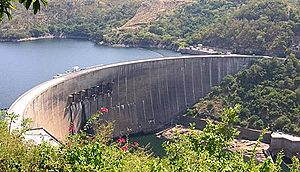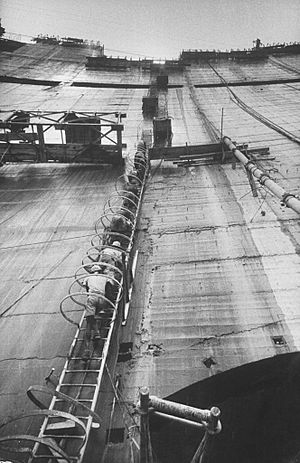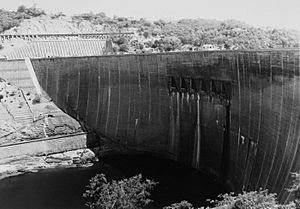Kariba Dam facts for kids
Quick facts for kids Kariba Dam |
|
|---|---|

The dam as seen from Zimbabwe
|
|
| Location | Zambia Zimbabwe |
| Construction began | 1955 |
| Opening date | 1959 |
| Construction cost | US$480 million |
| Owner(s) | Zambezi River Authority |
| Dam and spillways | |
| Type of dam | Arch dam |
| Impounds | Zambezi River |
| Height | 128 m (420 ft) |
| Length | 579 m (1,900 ft) |
The Kariba Dam is a huge concrete dam built across the Zambezi River in the Kariba Gorge. It sits right between the countries of Zambia and Zimbabwe.
This impressive dam is 128 metres (420 ft) tall and 579 metres (1,900 ft) long. It creates Lake Kariba, which is a massive lake stretching for 280 kilometres (170 mi). Lake Kariba holds an incredible 185 cubic kilometres (150,000,000 acre⋅ft) of water, making it one of the biggest dams in the world.
Contents
Building the Kariba Dam
The Kariba Dam is a special type of dam called a double curvature concrete arch dam. It was designed by engineers from Coyne et Bellier. Construction started in 1955 and the main part was finished by 1959.
However, the dam was not fully completed until 1977. This was mainly due to political issues between the countries involved. Sadly, 86 workers lost their lives during the construction of the dam.
The Zambezi River Authority owns and runs the Kariba Dam. This authority is equally owned by both Zimbabwe and Zambia. Since Zambia became independent, two other dams have been built on the Kafue River: the Kafue Gorge Dam and the Itezhi-Tezhi Dam.
Dam Safety Concerns
In March 2014, engineers held a meeting organized by the Zambezi River Authority. They warned that the dam's foundations had become weaker. They said that if repairs were not made, the dam could possibly fail.
In October 2014, the BBC reported more details. The dam was built on strong basalt rock. But over 50 years, water flowing from the spillway had worn away this rock. This created a huge hole that was undermining the dam's base.
Engineers warned that without urgent repairs, the entire dam could collapse. If this happened, a giant wave of water would rush through the Zambezi valley. It could reach the Mozambique border in about eight hours. This flood would also overwhelm Mozambique's Cahora Bassa Dam. It could knock out 40% of southern Africa's electricity supply. The Zambezi River Authority estimated that 3.5 million people's lives would be at risk. It would also cause huge damage to wildlife in the valley.
Generating Electricity
The Kariba Dam is very important for providing electricity. It supplies power to parts of both Zambia and Zimbabwe. Each country has its own power station at the dam.
Zimbabwe's power station is on the south side of the dam. It has been working since 1960. Zambia's power station is on the north side. It started operating in 1976.
Water Levels and Power
In January 2016, reports showed that the water level in the dam had dropped very low. It was only at 12% of its full capacity. The water level fell by 5.58 metres (18.3 ft) above the lowest level needed for making electricity.
This low water level was caused by not enough rainfall and too much water being used by the power plants. The reservoir was almost empty. This raised worries that both Zimbabwe and Zambia would face serious water shortages.
Images for kids
-
The dam as seen from Zimbabwe
See also
 In Spanish: Presa de Kariba para niños
In Spanish: Presa de Kariba para niños
 | Anna J. Cooper |
 | Mary McLeod Bethune |
 | Lillie Mae Bradford |





